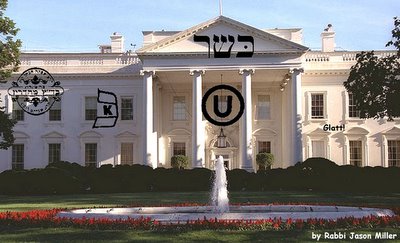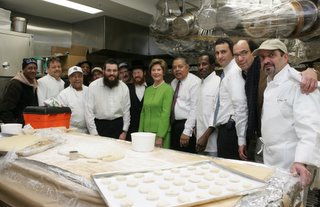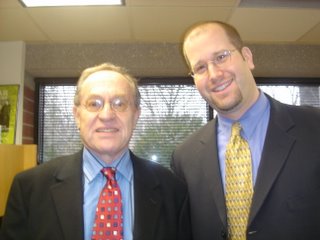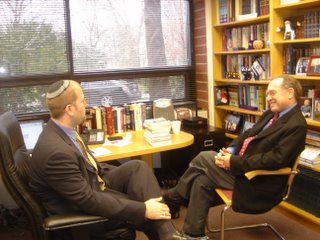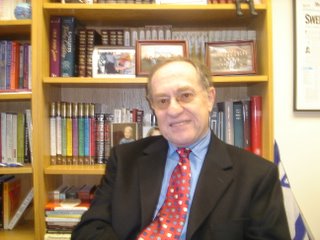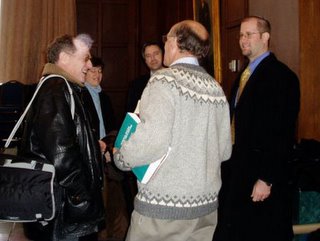From Haaretz
For new Fed chief, dad was one of the few Jews in town
When Ben Shalom Bernanke, U.S. President George Bush’s nominee to be the new Federal Reserve chairman, was a teenager in the small town of Dillon, South Carolina, in the 1960s, he helped lead services and roll the Torah scrolls in the town’s synagogue.
Judaism remains a part of Bernanke’s life, but the Princeton University economist does not wear his religion on his sleeve, associates say. According to friend and collaborator Mark Gertler, chairman of New York University’s economics department, Bernanke, 51, “keeps his feelings and beliefs private,” but they are really “embedded in who he is.”
Bernanke’s policy views, however, were on full display this week as he faced questions yesterday from the Senate Banking Committee, which probed him on his convictions about targeting inflation and the government’s budget deficit. Democratic senators, in particular, sought assurances that Bernanke, presently chairman of Bush’s Council of Economic Advisers, would be independent of the White House.
“I assure this committee that, if I am confirmed, I will be strictly independent of all political influences and will be guided solely by the Federal Reserve’s mandate from Congress and by the public interest,” Bernanke told the lawmakers.
Nominated by Bush on October 4 to succeed Fed chairman Alan Greenspan, Bernanke is expected to be confirmed soon by both the committee and the full Senate. He would take his seat on the Fed early next year, marking the end of Greenspan’s 18-year tenure.
Gertler said that Bernanke, as an academic who has done significant research on monetary policy, would institutionalize his approach at the Fed, unlike the oracular Greenspan, who came out of the private sector with a background in economic forecasting.
“When Ben steps down, we won’t worry as much about the replacement,” Gertler said. “Greenspan never really left a playbook.”
A disciple of Nobel Prize-winning economist Milton Friedman, Bernanke has written influential works on price stability, deflation and the Great Depression. “Ben is the Milton Friedman of his generation,” Gertler said. However, unlike Friedman, known as an apostle of free markets, Bernanke is “more of a technocrat than an ideologue.”
Bernanke has received words of support from several prominent liberals and critics of the Bush administration, including a former colleague at Princeton, New York Times columnist Paul Krugman.
Jeffrey Frankel, a Harvard economics professor who served on President Clinton’s Council of Economic Advisers, wrote in an e-mail to the Forward that Bernanke’s appointment “probably implies a slightly lower target for inflation, and thus slightly fewer jobs, over the next couple of years, than otherwise because every new central banker is aware that he has to establish inflation-fighting credibility at the beginning of this term, in order to take a more relaxed approach later on.”
Frankel called Bernanke “temperamentally well-suited to the Fed chairman job” and “off the charts in quality by comparison with most” other Bush nominees. “In fact,” Frankel added, “he would even be good by the standards of a Clinton administration.”
Born in Augusta, Georgia, one of three children, Bernanke grew up among only a handful of Jewish families in Dillon, where his parents ran a pharmacy. While Bernanke’s family was a relatively recent arrival, South Carolina has a history of being hospitable to Jews. At the turn of the 19th century, South Carolina had the most Jews of any state – fully a quarter of the Jews then living in America, by some estimates. Before the Civil War, Georgetown, the state’s third-oldest city, and Charleston, one of the nation’s most important cities in the colonial period, both elected several Jewish mayors.
Residents of Dillon, a town of about 6,500 habitants in the eastern part of the state near the North Carolina line, remember Bernanke fondly as a brainy boy who obsessed over baseball statistics, played the saxophone, taught himself calculus and scored 1590 out of 1600 on his SATs, the highest in the state that year.
“He’s 13 years old, and we’re discussing cosmology and the size of the universe,” Bernanke’s childhood friend, Nathan Goldman, recalled in an article in the Atlanta Journal-Constitution.
Bernanke went as an undergraduate to Harvard, received his doctorate from the Massachusetts Institute of Technology and was named a full professor at Princeton in 1985, in his early 30s. He was chairman of the economics department at Princeton University before being tapped by Bush in 2002 to be a member of the Federal Reserve Board and then last year to be chairman of the economic council. Bernanke is married to Spanish instructor Anna Bernanke, reportedly the daughter of refugees from Europe. They have two children.
Academic achievement characterized Bernanke’s family even in Europe. His paternal grandparents came from Austria. According to his uncle, Mortimer Bernanke, his grandmother graduated from medical school in Austria in 1919 – unusual for a woman of the time. The family immigrated to America in the early 1920s.
Bernanke’s parents, Phillip and Edna, kept a strictly kosher home. Their meat was bused in from Charlotte, North Carolina, where Edna’s father owned a kosher market for about 10 years after World War II and taught Hebrew school and tutored bar mitzvah students. The grandfather, who moved in with Bernanke’s family after his wife died, was called “reverend” for his great religious learning, family members said.
“He lived with us for 24 years,” Edna Bernanke said in a telephone interview with the Forward. “He studied with us.”
All the Bernanke children married Jews, Mortimer Bernanke said (also in a telephone interview). He still lives in Dillon. Edna and Phillip Bernanke now live in Charlotte.
When Ben Bernanke was growing up, Ohav Shalom, the synagogue in Dillon, could not support a full-time rabbi. His mother estimated that it served 12 families from the area, with about 35 people attending during holidays. It imported rabbinical students from the Jewish Theological Seminary to officiate each year during the High Holy Days. The students would stay at the Bernanke home, the only fully kosher one in the area. Rabbi Arnold Stiebel remembered the young Ben as a big help in the synagogue. “Just think, the youngster who helped me prepare the Torah scrolls and gave me numerous insider pointers is now the nominee to be chairman of the Federal Reserve,” marveled Stiebel, who now lives in Jerusalem, in a note that circulated widely via e-mail. “Well, it’s a small Jewish world.”
(c) Rabbi Jason Miller | http://blog.rabbijason.com | Twitter: @RabbiJason | facebook.com/rabbijasonmiller

